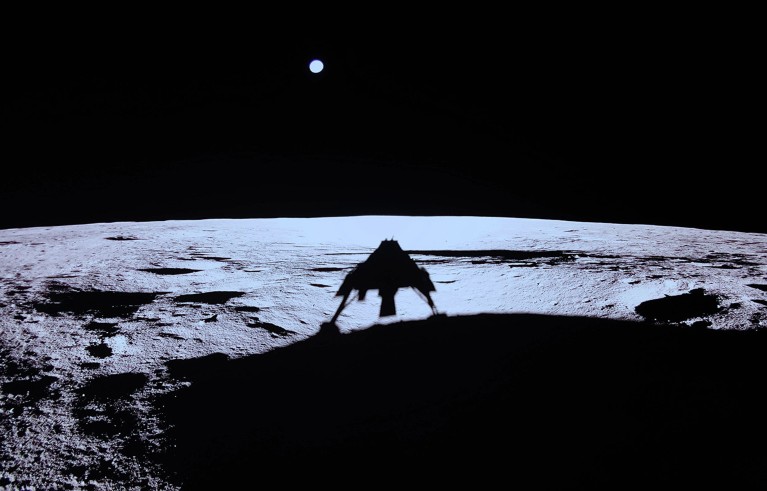Hello Nature readers, would you like to get this Briefing in your inbox free every day? Sign up here.

The shadow of the Blue Ghost lander on the lunar surface.Credit: Firefly Aerospace
Private spacecraft makes it to the Moon
A four-legged robot touched down on the Moon yesterday, becoming the first commercial spacecraft to ace a lunar landing. The Blue Ghost lander, built by Firefly Aerospace, aims to spend two weeks conducting science experiments provided by NASA. The landing is a win for NASA’s Commercial Lunar Payload Services programme, which contracts aerospace companies to fly scientific instruments to the Moon. Previous attempts have been lost in space, or crashed while attempting to land.
Nature | 4 min read
“They want to send us to the Dark Ages”
A US agency head who once called for the government to be “starved in order to dismantle it” is spearheading a second tsunami of layoffs at federal agencies. The layoffs ordered by Russell Vought, director of the White House Office of Management and Budget, will affect agencies including the National Institutes of Health (NIH), the National Science Foundation and the Environmental Protection Agency. At the same time, Trump’s Republican allies in Congress are working to pass major cuts to the federal budget that could wipe out entire scientific programmes and divisions. “We’ve already eviscerated the next generation of scientists” with a previous round of firings that targeted people on probation, says one NIH scientist. “Now they want to send us back to the Dark Ages by stopping science in its tracks completely.”
Nature | 7 min read
EU helps Ukrainian science push forward
The European Union says it will scale up its presence in Ukraine’s struggling research sector, building on the almost €59 million (US$62 million) in funding that Ukrainian research has so far received through Horizon Europe. Scientists hope that these moves will drive much-needed reforms in Ukraine’s research-funding system and breathe new life into its struggling innovation sector. All this is taking place in the midst of Russian attacks that are displacing and harming scientists, and destroying scientific infrastructure.
Nature Index | 8 min read
Features & opinion
How students are getting creative with AI
Gone are the days of using artificial intelligence (AI) just to summarize a research paper. Now, students are finding new and imaginative ways to integrate AI into their learning. PhD applicant Adriana Ivich used generative-AI chatbot ChatGPT to create simulations of people on her interview committee, using their real-world biographies and publications. Others are using such tools to generate podcasts and visualizations to bone up on new concepts, and even improve their work-life balance, by asking the chatbot to create work schedules with time for extra-curricular activities built in.
Nature | 8 min read
Video: Volcanic ash turned a brain to glass
The brain of a man who died nearly 2000 years ago was turned to glass by extreme conditions during the eruption of Mount Vesuvius — the only known example of such a transformation in animal tissue. Researchers concluded that an ash cloud well over 500 oC melted the man’s brain and then quickly dissipated, which allowed the liquid to cool into glass. The transformation has even preserved imprints of nerve cells that can be seen under a microscope.
Nature | 2 min video

